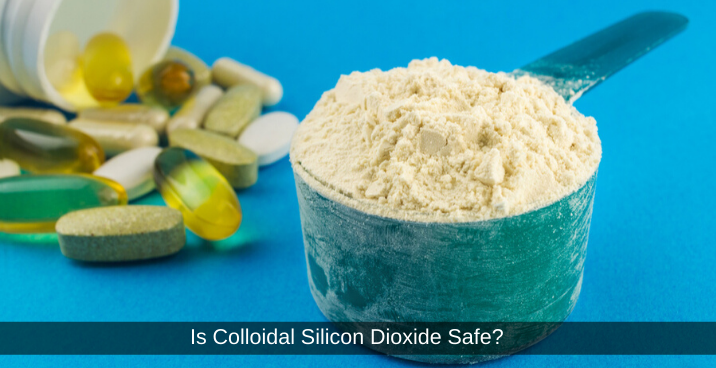 Colloidal silicon dioxide is an ingredient commonly found on food and medicine labels, but what is it? Is silicon dioxide bad for you? Read on to learn more.
Colloidal silicon dioxide is an ingredient commonly found on food and medicine labels, but what is it? Is silicon dioxide bad for you? Read on to learn more.
What is Colloidal Silicon Dioxide?
Silicon dioxide, which also goes by silica or silicate, comes in various forms. In nature, it is simply known as sand or quartz and occurs within the earth’s crust. It can also be found in water, plants, and animals. Silicon dioxide is a common ingredient in pharmaceuticals and certain herbs like horsetail plants.1 Horsetail is commonly used to support hair growth.
In food, colloidal silicon dioxide is commonly added to salt, seasoning salt, and baking soda. Thanks to its anticaking properties, it is also added to meat curing powders, spices, and wide range of other food products. Colloidal silicon dioxide is also biologically inert and nontoxic, and it does not dissolve in water. This makes it a common additive in tablet-making as a coating for pills, capsules, and dietary supplements.2
Colloidal silicon dioxide is also included in certain industrial applications as a thickening agent. This includes paints and dyes, as well as shampoos and other cosmetic products.
Safety of Colloidal Silicon Dioxide in Food and Supplements
With the wide usage and frequent inclusion of colloidal silicon dioxide, you may be worried about your exposure or consumption to it. Is silicon dioxide safe? The FDA considers colloidal silicon dioxide as generally safe, and most research shows that the silicon dioxide that we ingest via food and supplements is safe.
In fact, it has been found to not accumulate in the body. Excess silicon dioxide is flushed out via the kidneys according to the World Health Organization.3 Furthermore, researchers have found no link or association between silicon dioxide added to food and an increased risk of organ damage, disease, or mortality.4
Is silicon dioxide safe during pregnancy? Thus far, existing research has not found any evidence to suggest that additive silicon dioxide has any effect on birth weight, bodyweight, or reproductive health in general. This suggests that silicon dioxide is safe for pregnant mothers.4
Side Effects When Eaten vs. Inhaled
However, it is important to reiterate that silicon dioxide comes in various forms. The type of silicon dioxide that is added to foods, supplements, and medications is different from crystalline silica. Inhaling silicon dioxide dust is unsafe, and ongoing exposure to silica dust in the air can result in silicosis, a type of lung disease. Essentially, silica has a crystalline structure. Breathing it in introduces those crystals into your lungs but in a nanoparticle form. Those nanoparticle crystals create small cuts on your lung tissue. Over time, this creates scar tissue in the lungs, making it harder to breathe.5 Symptoms of silicosis include:- Chest pain
- Fever
- Weight loss
- Respiratory failure
Silicosis occurs with constant exposure to high levels of silica. This usually means that the average person should not have to worry about it. Silicosis is much more of a risk among those who work in mines, factories, or masonry positions. Employers in these industries are required to take the necessary precautions to ensure the safety of workers who are exposed to silica.5
Although inhaling silica may pose health issues, colloidal silicon dioxide is safe to eat, so you can have peace of mind the next time you see it on an ingredient list.
Sources:
- https://www.drugs.com/inactive/silicon-dioxide-colloidal-200.html
- https://sciencing.com/colloidal-silicon-dioxide-8725504.html
- http://www.inchem.org/documents/jecfa/jecmono/v05je04.htm
- https://efsa.onlinelibrary.wiley.com/doi/epdf/10.2903/j.efsa.2009.1132
- https://www.healthline.com/health/silicosis


